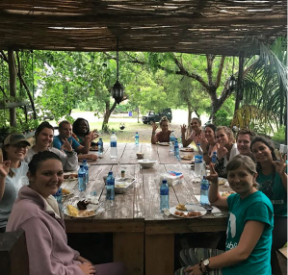Study Abroad in Tanzania
Program Details
- Location: Dar Es Salaam, Zanzibar, Tanzania
- U.S. State Department Travel Information for Tanzania
- U.S. State Department COVID-19 Information for Tanzania
- Program Dates: May 10 - June 2, 2022
- Travel Dates: May 13 - June 2, 2022
- Program Cost: $4854 plus tuition, tech fee, and estimated out-of-pocket expenses
- Online Application
The Maymester to Tanzania Program is designed to provide a collaborative experience in the fields of publish health and mathematics. The program will primarily be set in the cooler arid plains of Arusha in northern Tanzania. There will be opportunities of cultural exchange, understanding environmental preservation and sustainability, by visiting a National Park that is specific to region; each offering public health context consumer mathematics insight.
Public health theoretical perspectives, including the Health in All Policies will be used as a framework for the public health courses. Therefore, students will have the opportunity to engage in public health practice; health promotion and disease prevention initiatives, interpret health data, review health policy and gain understanding of theoretical principle, theories and concepts to contextualize, interpret and self-reflect what they encounter and experience.
Course Information
Student may take any 2 courses up to 7 credits. (Ex. PUBH 201 and MATH 139).
PUBH 201 – Philosophies and Principles in Public Health
Course Instructor: Fredanna McGough
Credits Offered: 3
Prerequisite: None
An exploration of underlying philosophies and principles of public health. An overview of social cultural, and physical environmental factors which influence perceptions and valuation of health, and condition responses to health-related knowledge.

Course Instructor: Sherer Royce
Credits Offered: 3
Course Prerequisite: PUBH 121 or approval by instructor.
Public health policy is often the result of advocacy efforts to improve social conditions. This course will provide an overview of public health policy issues and policy making in the United States as well as advocacy strategies for change. Reports indicate that health problems are heavily influenced by societal policies and environments that in some way either sustain the behaviors and practices that contribute to the problem or fail to foster healthier choices that could prevent the problem. Therefore, this course will provide insight and socio-political competencies needed to analyze the public policy environment for changing policies, systems and built environments that impact healthy decision-making behaviors.
MATH 139 – Basic Concepts of Contemporary Mathematics
Course Instructor: Menassie Ephrem
Credits Offered: 4
Prerequisite: None
The focus of this course is to develop mathematical thinking skills through problem solving and exploration. We will be studying such topics as logic, numbers, infinity, geometry, space, uncertainty and decision-making. Students will experience what mathematics is all about by delving into some beautiful and intriguing issues. Some basic goals for this course are to attain an understanding of some rich mathematical ideas, to build skills for analyzing life issues that transcends mathematics, and to develop a new perspective and outlook on the way you view the world. The overriding theme of the course is to gain an appreciation for mathematics and to discover the power to mathematical thinking in everyday life.
Faculty and Staff Leaders
 Fredanna M'Cormack McGough, Associate Professor, Public Health
Fredanna M'Cormack McGough, Associate Professor, Public Health
fmcorma@coastal.edu, 843-349-2991
Dr. Fredanna McGough is the Chair of the Department of Health Sciences and an Associate Professor of Public Health. Dr. McGough is originally from Sierra Leone and lived in Nigeria and Kenya before moving to the US. Dr. McGough completed her undergraduate degree in Health Sciences from the University of North Florida and she earned both her MS in Food Nutrition and PhD in Health Education from Southern Illinois University Carbondale in Carbondale, Illinois. As a registered dietitian and public health professional, Dr. McGough’s area of interest is exploring socio-ecological and dietary factors that affect maternal and child health outcomes and women’s health within global health perspectives and her research interests include sexual and reproductive health and accessibility to health care services.
 Sherer Royce, Associate Professor, Public Health
Sherer Royce, Associate Professor, Public Health
sroyce@coastal.edu, 843-349-2687
Sherer W. Royce is an Associate Professor of Public Health in the Department of Health Sciences. She holds a BA in Journalism and earned her Master of Public Health and PhD in Public Health from the University of South Carolina. Prior to a career in academics, Sherer worked for many years in public relations and public policy in Washington, DC. Most notable was her tenure in the Office of Economic and Domestic Policy within the White House. Dr. Royce’s research interests and expertise are focused on chronic disease prevention with emphasis on risk factor reduction (primarily tobacco use) via environmental, system, and policy changed. Much of her scholarship is applied community outreach primarily using Photovoice, a participatory action research methodology that empowers communities for changing social norms. Sherer is a member of Delta Omega, the national public health honorary and Eta Sigma Gamma, the national health promotion society.
 Menassie Ephrem, Associate Professor, Mathematics
Menassie Ephrem, Associate Professor, Mathematics
menassie@coastal.edu, 843-349-2436
Menassie Ephrem is an Associate Professor of Mathematics in the Department of Mathematics and Statistics. He holds a BS degree from Asmara University and an MS degree from Addis Ababa University in Mathematics and earned a PhD in Mathematics from Arizona State University. Prior to joining Coastal, Dr. Ephrem has worked as a professor of mathematics at two major universities in Africa and has a vast experience in relating mathematical concepts to the everyday issues in Africa. Dr. Ephrem’s research interest is in functional analysis and his particular research interest is Waveletts, his latest research publication is Hardy spaces.
Cost to Participate = Program Fee ($4854) + Tuition (Varies) + Technology Fee (Varies) + Out-of-pocket Expenses ($1145)
The tuition for this program is for Maymester term.
Included in Program Fee: Roundtrip airfare from U.S. to Tanzania; accommodations while in country; most meals; local transportation; planned excursions; and emergency medical insurance.
Not Included in Program Fee:
- Tuition
- Estimated out-of-pocket expenses not covered by program fee: $350 for travel vaccinations, $200 for COVID-19 testing (entry/reentry); $300 for optional excursions and activities; $145 passport cost; and $150 meals.
| Discounted Tuition for Education Abroad Students: $416/credit | |||||
|---|---|---|---|---|---|
| CCU credits | Program Fee | Tuition ($416/credit) | Technology Fee ($5/credit) |
Estimated Out-of-pocket Expenses |
Cost to |
| 3 credits | $4854 | $1248 | $15 | $1145 | $7262 |
| 4 credits | $4854 | $1664 | $20 | $1145 | $7683 |
| 6 credits | $4854 | $2496 | $30 | $1145 | $8525 |
| 7 credits | $4854 | $2912 | $35 | $1145 | $8946 |
Payment Schedule
| Payment | Due Date | Amount Due |
| Deposit | Oct. 27, 2021 | $300 (refundable until commitment deadline Dec. 4, 2021) |
| Remaining Program Fee Payment | Feb. 11, 2022 | $4554 |
| Tuition and Technology Fee Payment | May 7, 2022 | Varies (see above) |
After acceptance to the program, the payment of the program fee as well as payment of tuition can be made online through WebAdvisor or in-person/by phone through Student Accounts. Tuition charges are distinct and different from program fee charges. Please note that payments made with a debit or credit card will be charged a non-refundable service fee of 2.7 percent. For more information about methods of payment, visit Student Accounts.
Current Travel Conditions:
- CIA World Factbook for Tanzania
- U.S. State Department Country Information for Tanzania
- U.S. State Department COVID-19 Information for Tanzania
- CDC Health Information for Travelers to Tanzania
- AIG Country Report for Tanzania
CCU Travel Resources:
General Travel Resources:
- Know Your Travel Risk
- US Embassy Updates – COVID-Related Restrictions on Returning to the USA
- US Embassies – Country Specific COVID-Regulations for Entry and Stay by Country
- U.S. Department of State(DOS)
- Smart Traveler Enrollment Program (state.gov)
- Centers for Disease Control and Prevention(CDC)
- Overseas Security Advisory Council (OSAC)
- International Air Transport Association (IATA)
- Traveler’s Checklist (US Department of State)
- FBI Safety and Security for US Students Traveling Abroad
- World Health Organization (WHO)
- TripPrep


